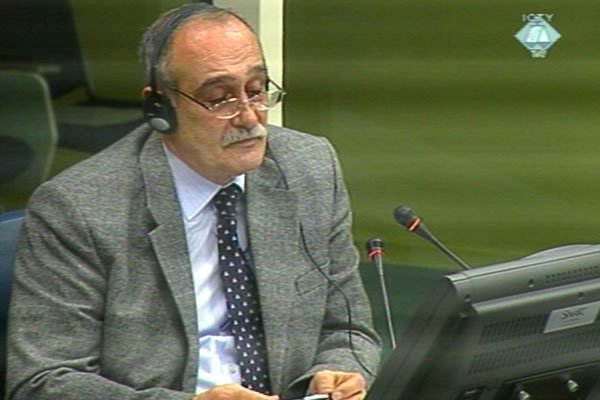Home
KARADZIC: I DIDN’T KNOW ABOUT CRIMES IN SREBRENICA
As he cross-examined General Ljubomir Obradovic, Karadzic tried to prove that he didn’t receive any ‘dramatic’ information about the crimes during the VRS operation in the Srebrenica enclave in July 1995. Karadzic renounced the Directive Seven from March 1995 which orders ‘restrictive issuing of permits’ for the passage of convoys to the enclave in order to make the civilians and UNPROFOR ‘dependent’ on the goodwill of the Bosnian Serb state and military authorities
 Ljubomir Obradovic, witness at the Radovan Karadzic trial
Ljubomir Obradovic, witness at the Radovan Karadzic trial In the examination-in chief, the former head of the Operations and Training Administration in the VRS Main Staff Ljubomir Obradovic claimed that he didn’t know anything about the prisoners of war and their exchange. Replying to Radovan Karadzic in the cross-examination, Obradovic showed enviable knowledge of the issue, confirming for the most part all the claims put to him by the accused.
Obradovic also confirmed Karadzic’s claim that the regular combat reports from the Drina Corps area of responsibility forwarded to Karadzic from the VRS Main Staff didn’t contain any ‘dramatic’ information about the illegal activities and crimes that would ‘alarm his advisors and make them inform [Karadzic] about it’, making it possible for him to take appropriate measures.
Karadzic showed the witness a series of reports from the relevant period, quoting parts about the regrouping of Serb forces in order to ‘seal off the enclave’, setting ‘ambushes’ for the Muslim groups fleeing in a rout, ‘the organized and planned transport of the population’ to Kladanj, the surrender of ‘the fleeing Muslims’, the passage of about 7,000 civilians through the Serb forces encirclement into the BH Army-controlled territory and the routing of the remaining groups of ‘enemy soldiers’.
Obradovic confirmed that the reports were not ‘dramatic’ enough for the advisors to relay them to Karadzic. This prompted Judge O-Gon Kwon to ask the witness ‘shouldn’t the report that the Serb forces entered a UN protected area on 11 July 1995 have been alarming enough for the president of the republic’. That part of the report was not read to the witness, he answered. The accused recalled that he personally gave Zdravko Tolimir approval to let the Serb forces enter Srebrenica. That information could not have come as a surprise to him, he remarked.
Karadzic tried to prove that as the RS president and VRS supreme commander he exercised command only at the ‘strategic level’. The ‘operational’ and ‘tactical’ command was exercised at the level of the Main Staff and the Corps staffs. Karadzic renounced the Directive 7 from March 1995 that bore his signature. The directive ordered ‘restrictive issuing of permits’ for the passage of convoys to the enclaves in order to make the civilians and UNPROFOR ‘dependent’ on the goodwill of the Bosnian Serb state and military authorities. Karadzic claimed the movement of convoys wasn’t restricted at all and corroborated it with documents issued by the Serb civilian and military authorities permitting convoys to enter the Srebrenica enclave.
Karadzic contends that General Ratko Mladic ‘rewrote’ the directive and turned it into an executive order and ‘modified some controversial elements’ in it. The accused put it to the witness that Mladic never asked him for his approval because it was clear to him that it was not Karadzic’s directive.
Ljubomir Obradovic continues his evidence next week when he will be re-examined by prosecutor Carolyn Edgerton.
Linked Reports
- Case : Karadzic
- 2012-02-23 WITNESS: KARADZIC RECEIVED REPORTS FROM CORPS LEVEL
- 2012-02-22 KARADZIC’S AND MLADIC’S GIFTS TO THEIR ‘BROTHER’ IN CANADA
- 2012-02-21 MASS MURDERS WERE NO SECRET ON EITHER SIDE OF DRINA RIVER
- 2012-02-27 DRAZEN ERDEMOVIC IN THE HAGUE FOR THE SEVENTH TIME
- 2012-02-28 RADOVAN KARADZIC’S SREBRENICA ‘FRENCH CONNECTION’
- 2012-02-28 KARADZIC, MILOVANOVIC AND ARKAN’S ‘PRIVATE TERRORISM’
